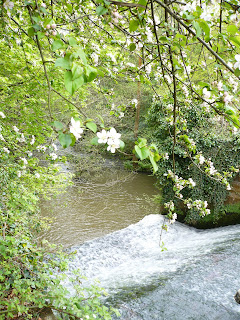 With the main agenda being getting out of a London which is now ruled by Boris Johnson the Hideous Clown, the exploration of the English country side continues this weekend as we head over to Hampshire. Wendy & Emma’s relos, Janice and Derek live in Petersfield, a town about 1.5 hours train ride Westwards from
With the main agenda being getting out of a London which is now ruled by Boris Johnson the Hideous Clown, the exploration of the English country side continues this weekend as we head over to Hampshire. Wendy & Emma’s relos, Janice and Derek live in Petersfield, a town about 1.5 hours train ride Westwards from Janice (family lineage research extraordinaire) and Derek (Snooker commentary extraordinaire)’s typical suburbia house made me homesick. It’s a cute little house tucked between others like itself in the quarter acre that I am so used to seeing back home in
 ornaments, a shed that the boys tinker around in… and a giant soft couch that moulds around the shape of your body when you throw yourself and your hang over in it…
ornaments, a shed that the boys tinker around in… and a giant soft couch that moulds around the shape of your body when you throw yourself and your hang over in it…The rides in J & D’s car through the leafy country roads was ecstatically beautiful. Every corner we turn in the windy roads there is something cute and characterful to admire. The thatched roofed houses that has been sitting there for centuries nurturing generations and generations of families; the regally painted and traditional road signs, the bold buckles and belts on the horses along the road, the hardy plants that spur out of cracks of geriatric
 stones of abandoned walls that once probably was the fort of a forgotten war. Rather than the awesomely dramatic and bleak scenery in the open spaces of
stones of abandoned walls that once probably was the fort of a forgotten war. Rather than the awesomely dramatic and bleak scenery in the open spaces of  windy roads expresses a way of life that has been forged and carried on for thousands of years, a way of co-existing with nature and making the somewhat unvaried everyday existence creative and meaningful along the way, and the ever abundant country-folk humour of the country folk.
windy roads expresses a way of life that has been forged and carried on for thousands of years, a way of co-existing with nature and making the somewhat unvaried everyday existence creative and meaningful along the way, and the ever abundant country-folk humour of the country folk.
the streams behind the town. Apart from the soothing views, here we found some very cute water birds and their young.

Moorhen feeding young in Winchester
http://en.wikipedia.org/wiki/Moorhen
http://www.rspb.org.uk/wildlife/birdguide/name/m/moorhen/index.asp
Duck and Ducklings
http://en.wikipedia.org/wiki/Duck
Here are pictures of the bluebells at Dingledell on Sunday, surrounding a completely different setting of a Buddhist monastery, where we took a laid back walk through the incredibly tranquil hill side with waterfalls and English pines.

Lastly, I'd like to end with the beautiful poem by John Keats, which he wrote as he walked upon the beautiful little country path.
Ode to Autumn
by John Keats c 1819
by John Keats c 1819
Seasons of mists and mellow fruitfulness,
Close bosom-friend of the maturing sun;
Conspiring with him how to load and bless
With fruit the vines that round the thatch-eaves run;
To bend with apples the moss'd cottage-trees,
And fill all fruit with ripeness to the core;
To swell the gourd, and plump the hazel shells
With a sweet kernel; to set budding more,
And still more, later flowers for the bees,
Until they think warm days will never cease;
For Summer has o'erbrimm'd their clammy cells.
Who hath not seen thee oft amid thy store?
Sometimes whoever seeks abroad may find
Thee sitting careless on a granary floor,
Thy hair soft-lifted by the winnowing wind;
Or on a half-reap'd furrow sound asleep,
Drowsed with the fume of poppies, while thy hook
Spares the next swath and all its twinèd flowers:
And sometimes like a gleaner thou dost keep
Steady thy laden head across a brook;
Or by a cyder-press, with patient look,
Thou watchest the last oozings, hours by hours.
Where are the songs of Spring? Ay, where are they?
Think not of them, thou hast thy music too,—
While barrèd clo uds bloom the soft-dying day
And touch the stubble-plains with rosy hue;
Then in a wailful choir the small gnats mourn
Among the river-sallows, borne aloft
Or sinking as the light wind lives or dies;
And full-grown lambs loud bleat from hilly bourn;
Close bosom-friend of the maturing sun;
Conspiring with him how to load and bless
With fruit the vines that round the thatch-eaves run;
To bend with apples the moss'd cottage-trees,
And fill all fruit with ripeness to the core;
To swell the gourd, and plump the hazel shells
With a sweet kernel; to set budding more,
And still more, later flowers for the bees,
Until they think warm days will never cease;
For Summer has o'erbrimm'd their clammy cells.
Who hath not seen thee oft amid thy store?
Sometimes whoever seeks abroad may find
Thee sitting careless on a granary floor,
Thy hair soft-lifted by the winnowing wind;
Or on a half-reap'd furrow sound asleep,
Drowsed with the fume of poppies, while thy hook
Spares the next swath and all its twinèd flowers:
And sometimes like a gleaner thou dost keep
Steady thy laden head across a brook;
Or by a cyder-press, with patient look,
Thou watchest the last oozings, hours by hours.
Where are the songs of Spring? Ay, where are they?
Think not of them, thou hast thy music too,—
While barrèd clo uds bloom the soft-dying day
And touch the stubble-plains with rosy hue;
Then in a wailful choir the small gnats mourn
Among the river-sallows, borne aloft
Or sinking as the light wind lives or dies;
And full-grown lambs loud bleat from hilly bourn;
Hedge-crickets sing; and now with treble soft
The redbreast whistles from a garden-croft;
And gathering swallows twitter in the skies.
The redbreast whistles from a garden-croft;
And gathering swallows twitter in the skies.










No comments:
Post a Comment